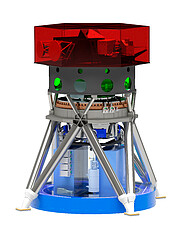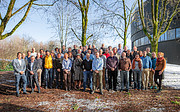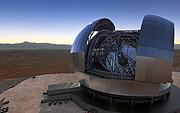Anuncio
Instrumento MICADO del ELT aprueba revisión preliminar de diseño
21 de Enero de 2020
Se ha logrado un importante hito en la revisión del diseño de MICADO, el primer sistema generador de imágenes para el Extremely Large Telescope (ELT) de ESO. El consorcio MICADO, junto con un grupo de expertos externos de todo el mundo, se reunió en la Sede Central de ESO en Garching, para una semana de profundo análisis que involucró la óptica, mecánica, software, electrónica y plan de presupuesto del instrumento, a fin de identificar cualquier aspecto que requiriera un mayor proceso de diseño. Tras la reunión, el equipo de MICADO resolvió todas las cuestiones principales planteadas durante la revisión y el instrumento ha aprobado formalmente la etapa de revisión preliminar de diseño. Ahora ya está en marcha una fase más detallada del diseño, que conducirá a la revisión de diseño final y a la construcción de los diversos componentes del instrumento.
Preparado tanto para obtener imágenes como para observaciones espectrográficas, MICADO (siglas en inglés de Multi-Adaptive Optics Imaging Camera for Deep Observations) se centrará en la obtención de imágenes y espectroscopia en el infrarrojo cercano, con una combinación de sensibilidad y precisión sin precedentes. Para evitar el efecto de distorsión de la atmósfera, MICADO contará con dos sistemas de óptica adaptativa. Uno utilizará el espejo deformable M4 del telescopio que brindará imágenes nítidas sobre un campo de visión estrecho; el otro utiliza las plenas capacidades del módulo de óptica adaptativa MAORY para proporcionar un campo de visión más amplio.
MICADO tendrá flexibilidad para observar diversos tipos de objetos y sus capacidades espectroscópicas podrán aportar considerablemente a nuestro conocimiento de la composición de dichos objetos. El instrumento permitirá estudiar algunos de los temas más relevantes de la astronomía, incluyendo la formación de exoplanetas, cómo los agujeros negros al centro de galaxias afectan a sus anfitriones, y cómo el Universo ha evolucionado con el transcurso del tiempo.
Información adicional
El consorcio MICADO está compuesto por: MPE (Instituto Max-Planck para Física Extraterrestre, Alemania); MPIA (Instituto Max-Planck para Astronomía, Alemania); USM (Universidad de Sternwarte en München, Alemania); IAG (Instituto de Astrofísica de la Universidad Georg-August-Göttingen, Alemania); NOVA (Escuela de Investigaciones Astronómicas de los Países Bajos, representada por la Universidad de Groningen, la Universidad de Leiden y el grupo de instrumentación óptica e infrarroja NOVA, basado en ASTRON, Dwingeloo, Países Bajos), Instituto Nacional de Astrofísica (INAF), CNRS/INSU: Centro Nacional de Investigación Científica/Instituto Nacional de Ciencias del Universo, en representación de LESIA, GEPI e IPAG, Francia; A*: (una asociación austríaca representada por la Universidad de Viena, la Universidad de Innsbruck, la Universidad de Linz y RICAM Linz, Academia Austríaca de Ciencias, Austria) y el Centro Finlandés de Astronomía junto a ESO (FINCA), Universidad de Turku, Finlandia.
Enlaces
- Multi-Adaptive Optics Imaging Camera for Deep Observations — MICADO
- Extremely Large Telescope de ESO
Contactos
Suzanne Ramsay
ESO Head of Project Science Department
Garching bei München, Germany
Tel: +49 89 3200 6665
Email: sramsay@eso.org
Bárbara Ferreira
ESO Public Information Officer
Garching bei München, Germany
Tel: +49 89 3200 6670
Cell: +49 151 241 664 00
Email: pio@eso.org
Sobre el anuncio
| Identificador: | ann20002 |
Our use of Cookies
We use cookies that are essential for accessing our websites and using our services. We also use cookies to analyse, measure and improve our websites’ performance, to enable content sharing via social media and to display media content hosted on third-party platforms.
ESO Cookies Policy
The European Organisation for Astronomical Research in the Southern Hemisphere (ESO) is the pre-eminent intergovernmental science and technology organisation in astronomy. It carries out an ambitious programme focused on the design, construction and operation of powerful ground-based observing facilities for astronomy.
This Cookies Policy is intended to provide clarity by outlining the cookies used on the ESO public websites, their functions, the options you have for controlling them, and the ways you can contact us for additional details.
What are cookies?
Cookies are small pieces of data stored on your device by websites you visit. They serve various purposes, such as remembering login credentials and preferences and enhance your browsing experience.
Categories of cookies we use
Essential cookies (always active): These cookies are strictly necessary for the proper functioning of our website. Without these cookies, the website cannot operate correctly, and certain services, such as logging in or accessing secure areas, may not be available; because they are essential for the website’s operation, they cannot be disabled.
Functional Cookies: These cookies enhance your browsing experience by enabling additional features and personalization, such as remembering your preferences and settings. While not strictly necessary for the website to function, they improve usability and convenience; these cookies are only placed if you provide your consent.
Analytics cookies: These cookies collect information about how visitors interact with our website, such as which pages are visited most often and how users navigate the site. This data helps us improve website performance, optimize content, and enhance the user experience; these cookies are only placed if you provide your consent. We use the following analytics cookies.
Matomo Cookies:
This website uses Matomo (formerly Piwik), an open source software which enables the statistical analysis of website visits. Matomo uses cookies (text files) which are saved on your computer and which allow us to analyze how you use our website. The website user information generated by the cookies will only be saved on the servers of our IT Department. We use this information to analyze www.eso.org visits and to prepare reports on website activities. These data will not be disclosed to third parties.
On behalf of ESO, Matomo will use this information for the purpose of evaluating your use of the website, compiling reports on website activity and providing other services relating to website activity and internet usage.
Matomo cookies settings:
Additional Third-party cookies on ESO websites: some of our pages display content from external providers, e.g. YouTube.
Such third-party services are outside of ESO control and may, at any time, change their terms of service, use of cookies, etc.
YouTube: Some videos on the ESO website are embedded from ESO’s official YouTube channel. We have enabled YouTube’s privacy-enhanced mode, meaning that no cookies are set unless the user actively clicks on the video to play it. Additionally, in this mode, YouTube does not store any personally identifiable cookie data for embedded video playbacks. For more details, please refer to YouTube’s embedding videos information page.
Cookies can also be classified based on the following elements.
Regarding the domain, there are:
- First-party cookies, set by the website you are currently visiting. They are stored by the same domain that you are browsing and are used to enhance your experience on that site;
- Third-party cookies, set by a domain other than the one you are currently visiting.
As for their duration, cookies can be:
- Browser-session cookies, which are deleted when the user closes the browser;
- Stored cookies, which stay on the user's device for a predetermined period of time.
How to manage cookies
Cookie settings: You can modify your cookie choices for the ESO webpages at any time by clicking on the link Cookie settings at the bottom of any page.
In your browser: If you wish to delete cookies or instruct your browser to delete or block cookies by default, please visit the help pages of your browser:
Please be aware that if you delete or decline cookies, certain functionalities of our website may be not be available and your browsing experience may be affected.
You can set most browsers to prevent any cookies being placed on your device, but you may then have to manually adjust some preferences every time you visit a site/page. And some services and functionalities may not work properly at all (e.g. profile logging-in, shop check out).
Updates to the ESO Cookies Policy
The ESO Cookies Policy may be subject to future updates, which will be made available on this page.
Additional information
For any queries related to cookies, please contact: pdprATesoDOTorg.
As ESO public webpages are managed by our Department of Communication, your questions will be dealt with the support of the said Department.



